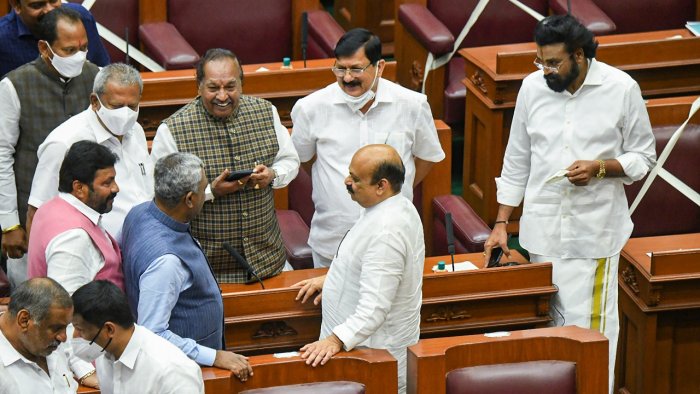
High drama and action, but BJP failed to pass anti-conversion Bill
BJP lacks majority in Legislative Council, but Upper House has limited powers; meanwhile, BJP and Congress spar on who first mooted the law

Amid high drama, the BJP-led government’s desperate back-door attempt to get the controversial anti-conversion bill passed in the Karnataka Legislative Council was foiled and the ruling party had to withdraw the decision to table the bill. The bill has already been passed in the lower house of the state legislature through a voice vote on Thursday (December 24).
It has now been deferred to the next Council Session, scheduled for early January.
Despite hectic efforts and tactics, the ruling BJP could not pass the bill in the Legislative Council at this Belagavi session.
The BJP had been on tenterhooks since the Karnataka Protection of Right to Freedom of Religion Bill, 2021, had to be cleared by the Vidhana Parishad or the Legislative Council, where the party lacks a majority.
Hence, the BJP had tried to firstly delay tabling the bill. The bill was not brought up in the morning session and the afternoon session which was to meet at 3 pm did not resume until 4 pm, according to media reports. The BJP was banking on the fact that a number of Congress members had left Belagavi and the passage of the bill would have become easier. But BJP members, including Council deputy chairperson MK Pranesh, had left Belagavi.
The ruling party summoned them to return and delayed the afternoon session to wait for them. And, BJP’s floor leader Kota Srinivas Poojary and other party leaders went into a huddle with Council chairperson Basavaraj Horatti’s chamber. Suspecting something was afoot, Congress MLCs rushed into Horatti’s chamber and questioned the reasons for the delay in resuming the House.
Also read: BJP government in Karnataka passes anti-conversion bill in assembly
The BJP’s strategy was to get the bill passed when the Opposition had fewer members on the floor. Earlier, they had said the bill will not be tabled and then deliberately dragged their feet about bringing it up in the morning session since they wanted their members to return to Belagavi, Opposition leaders told the media.
After the House reassembled Horatti said that the delay was unintentional, even as the Opposition members urged him to give them time for their members to return or adjourn the session. Horatti adjourned the House for five minutes to hold a discussion with ruling party members and the Opposition.
Finally, BJP’s floor leader, Kota Srinivas Poojary said it would be taken up in the next session. Deputy chairman Pranesh adjourned the House sine die. But, the entire fracas left Horatti red-faced and embarrassed and media reports said that he even considered resigning from his post.
Meanwhile, expert opinion is divided on whether the government can bring the bill back to the Assembly immediately and pass it once again. The Assembly, which has elected members, is empowered to prevail on any piece of legislation.
However, some experts point out that since it’s not a money Bill, the Assembly’s accent alone will not do, and the Council’s clearance is a must. Not all Indian states have Councils, and not too many pieces of legislation have been as controversial as the anti-conversion bill, so there aren’t too many precedents to this situation.
Political experts say the Council’s powers are limited and even if it doesn’t immediately clear the bill, the government can find a way around it. Primarily, as enshrined in Article 197 of the Constitution, the Vidhana Parishad, or the Legislative Council, has the power to delay a Bill, but not effect changes to it.
In the 75-member Karnataka Legislative Council, the BJP has 26 members while the Congress has 29. There are 11 JD(S) members and five independents, and the balance are vacant seats. With Congress support almost fully ruled out, the JD(S) offers hope to the BJP.
Whose idea was it?
Meanwhile, the BJP and the Congress have been sparring over which government first mooted the idea of an anti-conversion law. While the Congress has been opposing the bill hammer and tongs, the BJP has been quick to say that it was, in fact, the Grand Old Party that proposed the law when it was in power.
Former Karnataka Chief Minister and Leader of Opposition K Siddaramaiah termed the bill ‘anti-Constitution and anti-human being’, and part of ‘RSS agenda’. However, JC Madhuswamy, State Law and Parliamentary Affairs Minister, placed on the record in the Assembly that the bill was initiated in 2016 by the then Siddaramaiah government.
Chief Minister Basavaraj Bommai also reiterated this, saying: “Certainly, there is nothing to hide. He (Siddaramaiah) himself had printed the bill and signed the draft. He is a part of it. He approved the RSS agenda in 2016 itself.”
The bill seeks to provide for the protection of the right to freedom of religion and prohibition of unlawful conversion from one religion to another by misrepresentation, force, undue influence, coercion, allurement or by any fraudulent means. It stipulates imprisonment of up to 10 years for forced religious conversion of members belonging to the SC and ST communities, and women.


